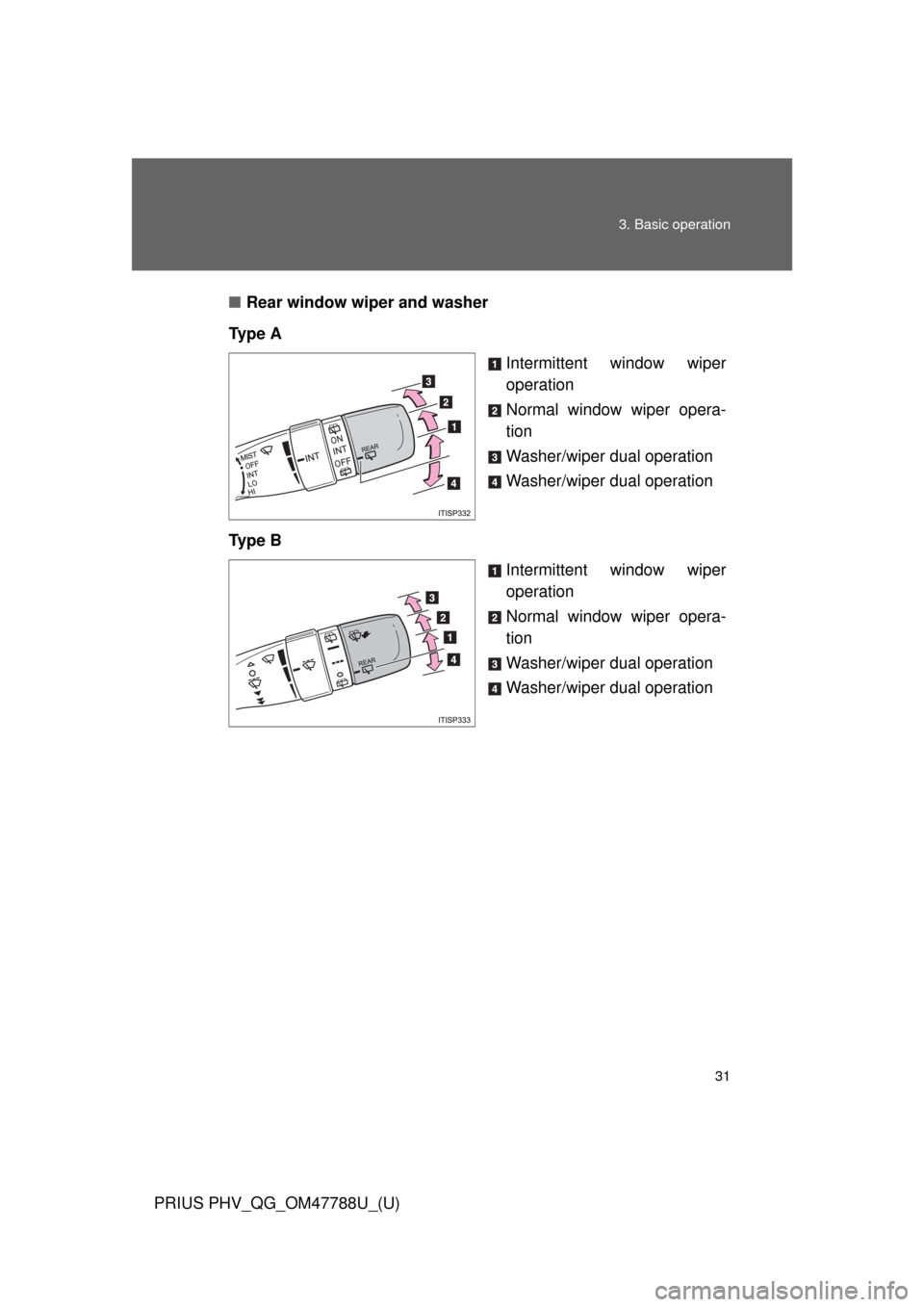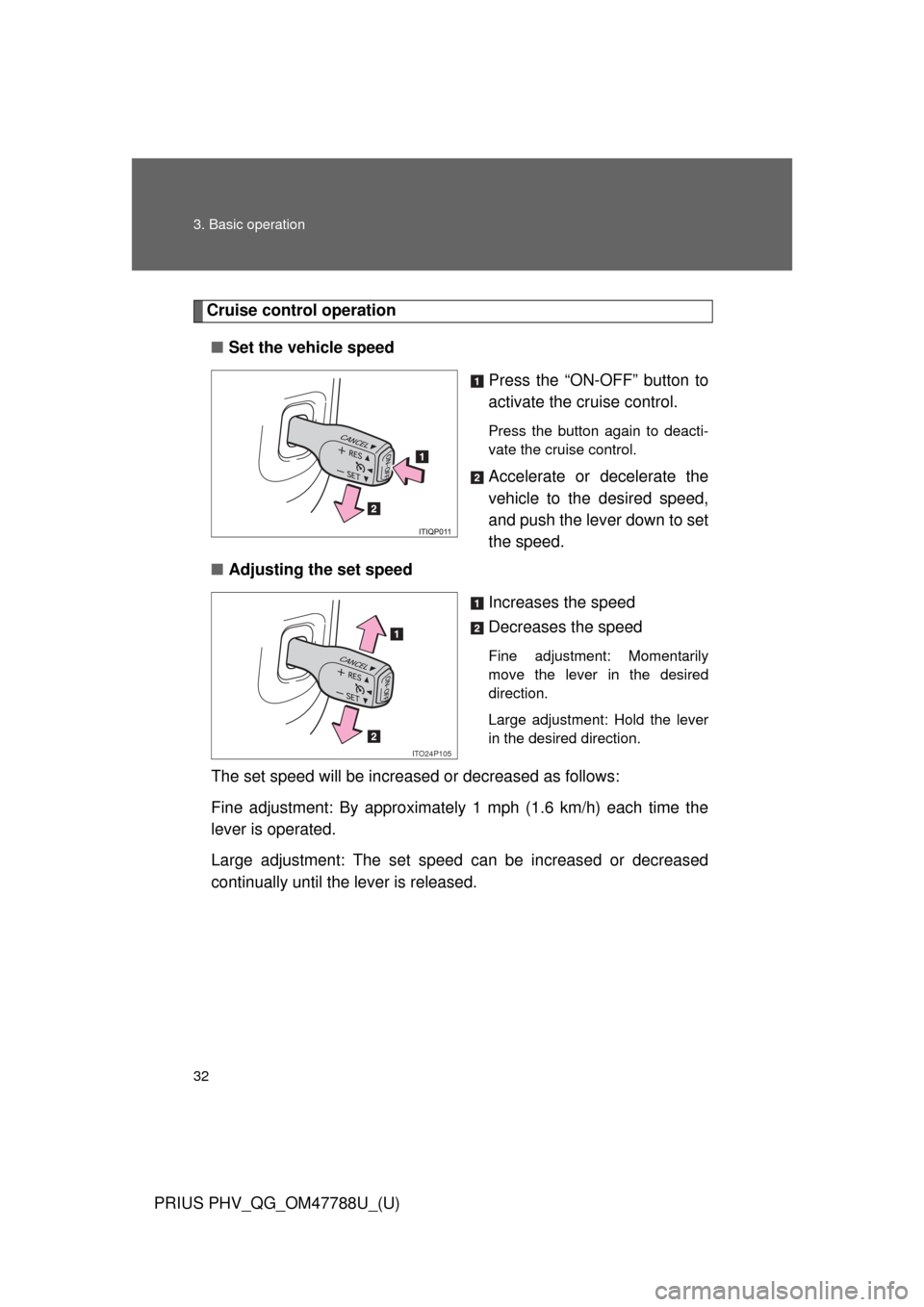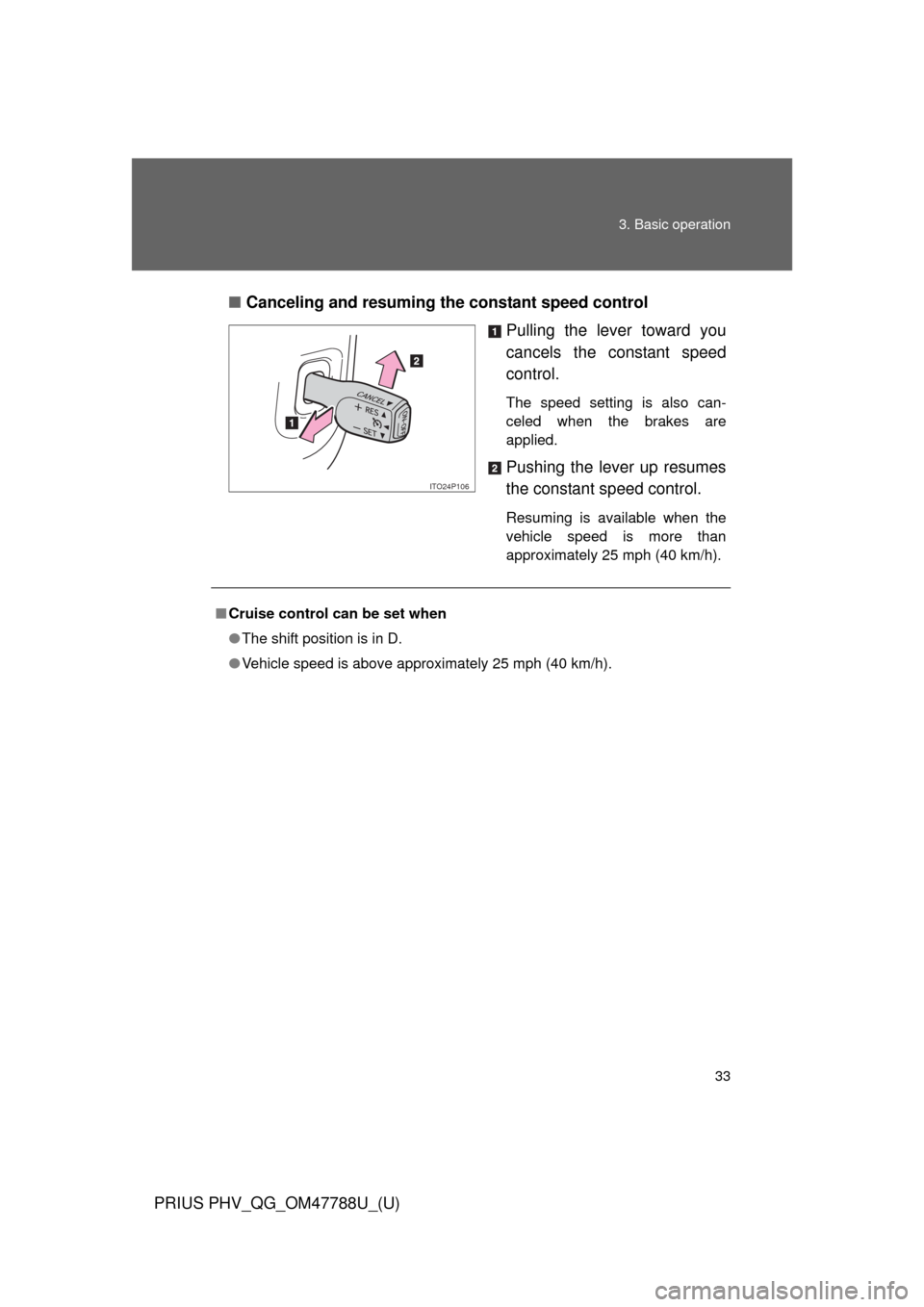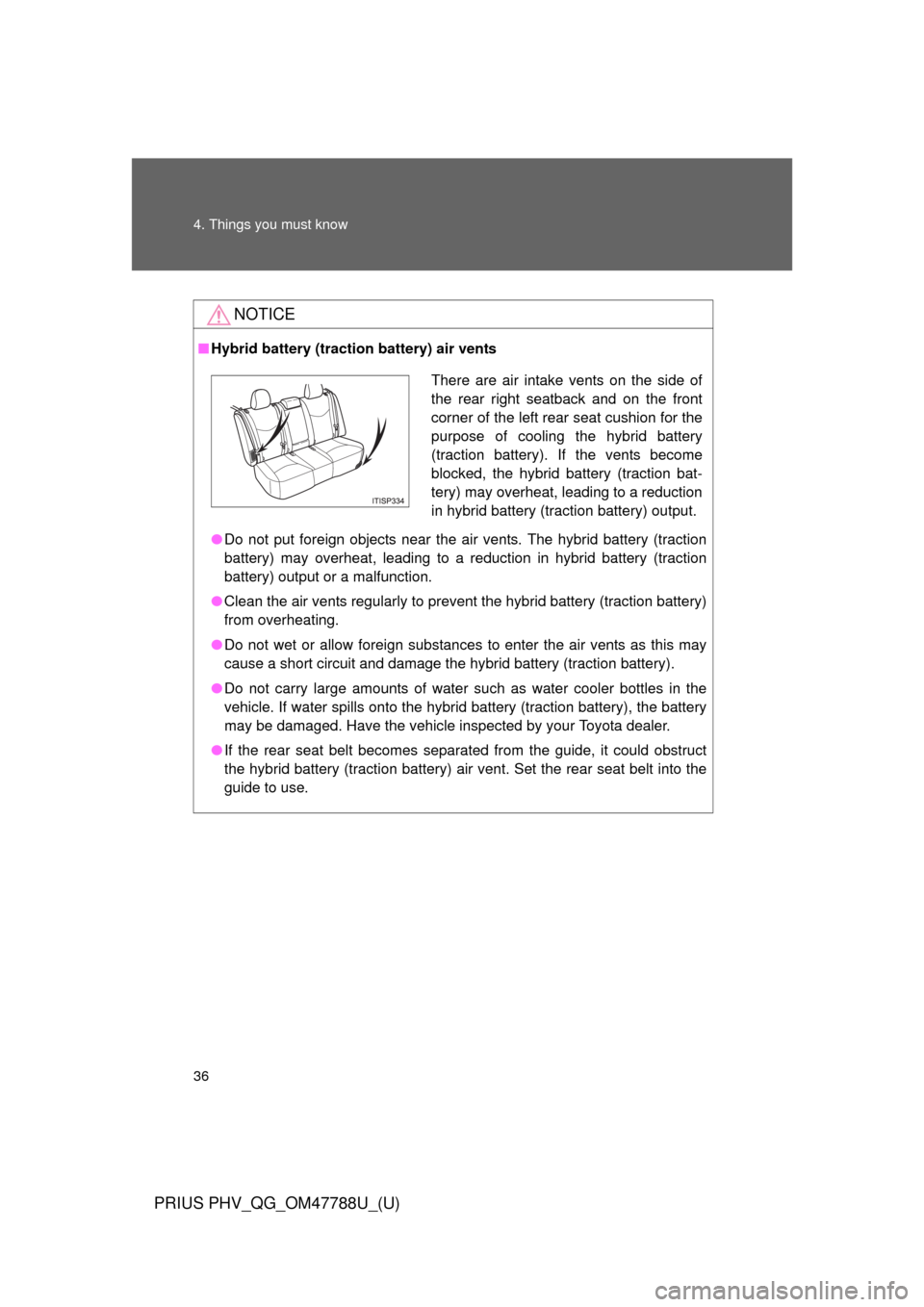TOYOTA PRIUS PLUG-IN HYBRID 2013 1.G Quick Reference Guide
Manufacturer: TOYOTA, Model Year: 2013, Model line: PRIUS PLUG-IN HYBRID, Model: TOYOTA PRIUS PLUG-IN HYBRID 2013 1.GPages: 36, PDF Size: 1.41 MB
Page 31 of 36

31 3. Basic operation
PRIUS PHV_QG_OM47788U_(U)■Rear window wiper and washer
Ty p e A
Intermittent window wiper
operation
Normal window wiper opera-
tion
Washer/wiper dual operation
Washer/wiper dual operation
Ty p e B
Intermittent window wiper
operation
Normal window wiper opera-
tion
Washer/wiper dual operation
Washer/wiper dual operation
Page 32 of 36

32 3. Basic operation
PRIUS PHV_QG_OM47788U_(U)
Cruise control operation
■Set the vehicle speed
Press the “ON-OFF” button to
activate the cruise control.
Press the button again to deacti-
vate the cruise control.
Accelerate or decelerate the
vehicle to the desired speed,
and push the lever down to set
the speed.
■Adjusting the set speed
Increases the speed
Decreases the speed
Fine adjustment: Momentarily
move the lever in the desired
direction.
Large adjustment: Hold the lever
in the desired direction.
The set speed will be increased or decreased as follows:
Fine adjustment: By approximately 1 mph (1.6 km/h) each time the
lever is operated.
Large adjustment: The set speed can be increased or decreased
continually until the lever is released.
ITO24P105
Page 33 of 36

33 3. Basic operation
PRIUS PHV_QG_OM47788U_(U)■Canceling and resuming the constant speed control
Pulling the lever toward you
cancels the constant speed
control.
The speed setting is also can-
celed when the brakes are
applied.
Pushing the lever up resumes
the constant speed control.
Resuming is available when the
vehicle speed is more than
approximately 25 mph (40 km/h).
ITO24P106
■Cruise control can be set when
●The shift position is in D.
●Vehicle speed is above approximately 25 mph (40 km/h).
Page 34 of 36

34
PRIUS PHV_QG_OM47788U_(U)
4. Things you must know
■Regenerative braking
In the following situations, kinetic energy is converted to electric energy and
deceleration force can be obtained in conjunction with the recharging of the
hybrid battery (traction battery).
●The accelerator pedal is released while driving with the shift position in D
or B.
●The brake pedal is depressed while driving with the shift position in D or
B.
■Gasoline engine operation in EV mode
Even if there is a sufficient amount of electricity remaining in the hybrid bat-
tery (traction battery) and EV driving range is being displayed, the gasoline
engine may operate automatically in the following circumstances (EV driving
will be returned to automatically after EV driving becomes possible again):
●When the heater etc. is in use.
●When the temperature of the hybrid system is high.
The vehicle has been left in the sun, driven on a hill, driven at high
speeds, etc.
●When the temperature of the hybrid system is low.
The vehicle has been left in temperatures lower than about 32 °F (0 °C)
for a long period of time etc.
●When power is needed temporarily, for example when accelerating sud-
denly.
●When vehicle speed is more than approximately 62 mph (100 km/h).
●When the accelerator pedal is depressed firmly or the vehicle is on a hill
etc.
●When the outside temperature is low (less than 14 °F [-10 °C])
The gasoline engine may also operate in circumstances other than those
listed above, depending on conditions.
Page 35 of 36

35 4. Things you must know
PRIUS PHV_QG_OM47788U_(U)
■When continually using EV mode only
After driving for approximately 124 miles (200 km) with the gasoline engine
off, the gasoline engine may start for a short amount of time in order to pro-
tect the system.
■Conditions in which the gasoline engine may not stop
The gasoline engine starts and stops automatically. However, it may not stop
automatically in the following conditions
*:
●During gasoline engine warm-up
●When the temperature of the hybrid battery (traction battery) is high or
low
●During hybrid battery (traction battery) charging
●When the heater is switched on
*: Depending on the circumstances, the gasoline engine may also not stop
automatically in situations other than those above.
CAUTION
■While driving
Because there is no engine noise when the vehicle is being driven using the
electric motor, pedestrians in the vicinity may not notice the vehicle. Even
though the vehicle is equipped with the vehicle proximity notification system,
drive with care as pedestrians in the vicinity may still not notice the vehicle if
the surrounding area is noisy.
Page 36 of 36

36 4. Things you must know
PRIUS PHV_QG_OM47788U_(U)
NOTICE
■Hybrid battery (traction battery) air vents
●Do not put foreign objects near the air vents. The hybrid battery (traction
battery) may overheat, leading to a reduction in hybrid battery (traction
battery) output or a malfunction.
●Clean the air vents regularly to prevent the hybrid battery (traction battery)
from overheating.
●Do not wet or allow foreign substances to enter the air vents as this may
cause a short circuit and damage the hybrid battery (traction battery).
●Do not carry large amounts of water such as water cooler bottles in the
vehicle. If water spills onto the hybrid battery (traction battery), the battery
may be damaged. Have the vehicle inspected by your Toyota dealer.
●If the rear seat belt becomes separated from the guide, it could obstruct
the hybrid battery (traction battery) air vent. Set the rear seat belt into the
guide to use.
There are air intake vents on the side of
the rear right seatback and on the front
corner of the left rear seat cushion for the
purpose of cooling the hybrid battery
(traction battery). If the vents become
blocked, the hybrid battery (traction bat-
tery) may overheat, leading to a reduction
in hybrid battery (traction battery) output.